- Home
- Neal Asher
The Skinner Page 21
The Skinner Read online
Page 21
‘What?’ Peck asked Pland.
‘If you don’t know by now, you never will,’ said the crewman, coming over with a small jug and a hide bag. Peck shrugged and continued at his blowing while Pland poured oil into a pan and set it on the brazier. When Peck was satisfied with the glowing charcoal, and rocking back on his heels, Pland dropped square slices of boxy meat into the pan. The sudden sizzling and waft of savoury smoke across the deck was Ambel’s signal to come out of his cabin.
‘Ah, boxy,’ he said, then with a glance at Pland, ‘We got any of that Dome bacon left?’
Pland nodded and wandered off to investigate. Ambel watched him go, reflecting how it was strange that the stuff was still called ‘bacon’, it never having been within a light-year of a pig, or any other animal for that matter. He turned his attention now to the sail, who was audibly sniffing at the smoke from the pan and looking dubious.
‘How are you called?’ Ambel asked it, as was proper courtesy.
The sail turned its head towards him, and Ambel took an involuntary step backwards when he realized just how big the creature was. It exposed its teeth in what might have been a grin.
‘Windcheater,’ it replied, and all the crew on deck stood still with their mouths open. They’d never before encountered a sail without the name ‘Wind-catcher’. True, they’d heard rumour of a sail that had actually grasped how a name could be an individual thing, but like so many other Hoopers, had dismissed the rumour as nonsense.
‘Only kidding,’ said the sail. ‘It’s Windcatcher really.’
They closed their mouths and got on with their work, quickly trying to forget this upset to the natural order of things.
‘Pleased to make your acquaintance, sail,’ said Ambel, giving the creature a look. He had already noticed the bean-shaped device attached to the side of its head, and he knew precisely what it was.
The sail snickered and shook its wings.
Windcheater surveyed the ship with intense interest and recalled when, long ago, he had been here last. The Earther human woman had been aboard then, and he remembered how he had tried to bite her when she sneaked up on him to remove a sample of his skin. Memory of that brought back to him the memory of what had happened afterwards. The Captain, with some crew and the woman, had gone ashore, and after traumatic events he had only learnt about later, returned aboard carrying a certain box that was still here now.
Windcheater could even hear the whispering. The man he once threw from the top of the Big Flint was here now . . . in part.
The sail tested the movement of the spars and found that they were well greased in their sockets, and that there was little scope for slack movement between the three masts. Pulling on the reefing cables, he released the fore and aft sails and checked the movement there. Again, everything seemed fine. He lowered his head so as to inform the Captain, then abruptly pulled away from the smell of charring meat. He had never quite understood this human preference for incinerating perfectly good fresh meat prior to consuming it. It was like so many other things the humans did that he could not quite get a handle on. As he watched them eating their food, he thought back again to a time long ago.
Windcatcher had been the cleverest of all the sails and the most curious about these strange creatures that had descended from the sky, but the autoguns and intruder defences they had installed around the island they occupied had been enough to deter the most inquisitive, and thus the situation had remained for a very long time. Then had come internal strife, after the arrival of more of the same creatures, and the defences were gone and these creatures, these humans, came out into the world. Windcatcher’s curiousity became almost a painful thing when these humans built movable shells out of peartrunk and yanwood timber in which to float about on the seas.
At first he had flown at a safe distance, but sometimes close – especially in the night – and listened to the sounds they made to each other. He’d realized from the start that these sounds were a language much like that of the sails, and had quickly memorized it all. Learning what the words actually meant had taken somewhat longer, nearly one human century, and even then it had been difficult to grasp that they only had so few words to describe the wind. And as for names . . .
When Windcatcher had seen a ship drifting in the sea, without its sail of normal fabric, he had quickly grasped the opportunity this presented. Settling on the spars of the ship, he had gazed down upon the bemused crew and told them, ‘I am wind catcher.’ And so it had all begun. The other sails had soon joined him in this diversion – it was substantially more interesting than sitting on a rock discussing the weather. They, like the then original Windcatcher, had not grasped the concept that individuals could possess individual names and by the time they did, the tradition of them being called ‘Windcatcher’ had been established. The first sail to break with this tradition had been the original Windcatcher himself, when he had changed his name to ‘Windcheater’. But then he had always been one to break new ground.
After reminiscing, he accessed, through his aug, a communication channel that had been opened in the night. The first communication then being, ‘You still into dodgy artefacts, sail?’
‘Are you still there?’ he asked over the ether, still finding it difficult to talk without actually opening his mouth.
‘I ain’t going nowhere until this fucking fish has a bowel movement,’ replied Sniper’s irritated voice.
‘Aren’t you controlling that crazy carp, then?’
‘Nah, I’m recharging in readiness for that bowel movement. Molly here’s just got a bit confused, and seems to want to hang around the ship. Understandable, as it’s a long way from home. Tell me, how much you say the Warden’s paying you for this?’
‘A thousand a day.’
‘Yeah, thought so. But what the hell is there to see on that ship?’
‘Nothing much. I was hungry and needed a rest so I thought I’d stop by. The way I see it, the longer I’m out here, the more money I’ll get. If the Warden tells me to move on, then I will. Don’t see the point in putting in too much effort,’ said Windcheater.
‘You like the idea of wages, don’t you?’ said Sniper. ‘It ever occur to you that a few steaks is pretty cheap payment for the work you do as a sail? Without you, they’d need a fabric mainsail, extra rigging and extra crew.’
Windcheater blinked and surveyed the Treader. Boris was at the helm, steering the ship, but the others were scattered about the deck at minor tasks. That had not really occurred to him. Yes, over the ages he had seen the design of the Hoopers’ ships changing and, until this moment, had only viewed those changes as ones intended to more easily accommodate his kind. It seemed almost a reversal now to realize that the benefits were really a bit one-sided. Through his aug, he accessed a text on Hooper ships and sailing practices.
‘The crew-members all take a percentage of the ship’s profits,’ he said.
‘A sail could demand that, too’ said Sniper. ‘But, he’d probably have to agree to stay with the ship for the entire duration of the voyage.’ Sniper then transmitted the address of a particular site, and Windcheater studied with interest the sample work contracts there displayed. He decided then that, when the Warden was done with him, things were going to change.
The wound on her hip was now hurting less than the after-effects of the stun blast. Parting the burnt fabric of her trousers she saw that already the hole had filled with pink scar tissue, which was slowly welling to the surface of the wound. The Batians and Frisk, in their overconfidence in their abilities, had forgotten that she too was a Hooper with quite a few years behind her. Had she been a normal human, her surprise blows would have had no effect on the one called Svan – Batians were tough. Anyway, she had survived. The distant sound of a couple of explosions had long since faded, as had the wail of her house computer when it was blown. No doubt they had tried to either cut or blast their way through this door, but once it had closed she knew she was safe. The amount of energy required to pe
netrate a metre of what had so far only ever been described simply as ‘Prador armour’ – the superconductive and highly impact-resistant exotic metal that had been one of the reasons that ancient war had dragged on for so long – would have been sure to draw the attention of the Warden, and Tay was certain Frisk was not prepared to risk that. She wondered just what Frisk had thought about her having such an incredibly impervious safe installed here, but then Frisk did not know how valuable was the item Tay kept here. The historian grasped the edge of one of the coffin-cases to haul herself to her feet, then pressed her palm to the lock in the case’s surface.
‘Open viewing panel,’ she instructed.
In the surface of the case a rectangular section faded from shiny chrome to transparency, revealing that the case indeed served a purpose similar to a coffin. There had been no paintings here.
‘Well, I did get all of your features right,’ said Tay, gazing down at David Grenant. She then, with a stab of her fingers, initiated a touch-console beside the window and began studying the readouts. The feeding system was still being utilized and Intertox levels were being maintained – like this he could last almost indefinitely. She touched in a sequence she had not used in a little while, then waited. After a minute, Grenant’s face twitched – then, he opened his eyes. For a second he appeared utterly confused, then he started to jerk and shake and whip his head from side to side. She’d previously noticed how it always took him a little while to remember precisely what his fate was. Now she stared at him calmly as his silent screams frosted the underside of the viewing window. Grenant’s entombment had been one of the more imaginatively horrifying of Francis Cojan’s punishments, and Tay saw no reason to change that: it was history after all. She then reversed the touch sequence and he slowed to immobility and finally closed his eyes.
Glancing across at the other, empty, coffin-case, she contemplated the fortuitous workings of fate. When, if her plan evolved over many years came to fruition and she got to open her museum on Earth, this one exhibit would be the making of her fortune. Perhaps an additional exhibit would ensure this success. She smiled to herself, then sniffed at the air. First she had to get out of here, before the air – no longer renewed by the house computer – turned bad.
Tay pushed herself upright and limped over to the control panel she had used to close the door. There she paused. She had no way of knowing what might lie on the other side of the door. Frisk could be waiting for her, even though a few hours had already passed. Tay hesitated, and in that moment the opening light on the panel flickered, and she listened to the clicking as the lock mechanism disengaged. No, surely she hadn’t touched it. Frisk! Tay turned and stared in horror at the door, as it swung open. She would not now be able to close it again until it had reached its fully open position.
Grenant! She limped over to his coffin-case and slapped her hand down on the palm lock.
‘Open!’
Black lines quartered the lid of the coffin-case and those quarters began slowly to spin aside. Inside the case, Grenant was fully dressed, his fingers clawed above his chest, where he had been scraping at the lid. At his hip was an empty holster. Damn! She’d forgotten that she’d previously moved his weapon to the model she had constructed of him in the museum, mainly to prevent him trying to draw it and use it on himself here – the little projectile weapon would not have been sufficient to drill a hole in his coffin. She hardly dared look up now as the door clunked into its fully open position.
‘I thought you were advised to get away from here,’ spoke an irritated voice.
Tay stared out into the ruin Frisk and her Batians had made of her home, then focused on the object visible in the doorway. Here hovered an iron-coloured cockle, half a metre across.
It opened its bivalve shells to expose glimmers of greenish light as it spoke again. ‘You’re lucky to be alive,’ it said. Then, ‘Who’s your friend?’
‘Who are you?’ Tay asked, slapping her hand on the coffin’s locking mechanism.
‘I’m SM Twelve, the one they usually send to clear up other people’s messes,’ it informed her. ‘Now, I can see there’s quite a mess here. Perhaps, through me, you’d like to tell the Warden all about it?’
‘Close,’ Tay instructed the coffin-case, then watched it do so before moving away. As she walked to the door of the safe, the drone retreated into the room beyond and hovered in midair. With a touch, Tay had the safe door closing behind her, and then she stood surveying the wreckage. It was vandalism, plain and simple, like someone had gone berserk with a gas-system pulse-gun. The furniture was burnt, even the floor, ceiling and walls were distinctively scored, cabinets smashed. Books, some burnt and some still burning, were strewn all about, and the computer console was a hollowed-by-fire ruin.
‘It seems they had some sort of grudge against you.’
The voice that now issued from the mollusc drone was no longer its own, Tay realized instantly, but that is what it wanted her to know. Picking her way through the debris, she moved to the entrance hall – the drone trailing along behind her.
‘A grudge?’ she asked.
‘The Batian mercenaries that came here – presumably in search of Sable Keech,’ replied the Warden.
‘Oh, I don’t think they had a grudge,’ Tay replied, stepping out into soft green light.
‘There does seem an excessive amount of damage here.’
‘Not done by them, I should think. It’s not part of their remit. That lot,’ Tay gestured over her shoulder with her thumb, ‘was probably done by their employer, once she realized she couldn’t get at me. She has a long history of throwing spectacular tantrums. And now, of course, she’s quite mad.’
There was a long silence from the drone as Tay headed for her museum. Shortly before she reached the structure, the drone hummed ahead of her and zipped inside. Following it in she was pleasantly surprised to see no damage here at all. The drone was now hovering above the head of the Skinner, and together they presented a sinister apparition.
Tay stared up at it. ‘No explosives? No booby-traps?’ she asked.
‘None,’ now replied the voice of SM12 again.
‘I thought not. Her arrogance and self-regard would not allow her to destroy this, though her love of inflicting pain and terror would have let her destroy me – though she would have labelled it an act of self-preservation.’
‘Who is this employer you refer to?’ asked the voice of the Warden, quickly returning.
‘You haven’t worked that out?’
‘I have some idea, but I would like to hear the answer from you.’
‘Rebecca Frisk,’ said Tay, swinging her gaze down to the model of that very person. ‘She must have cored herself and swapped into another human body. It must have taken some deep re-programming to have whoever she put into her own previous body play the part of Frisk herself, but then she would have had access to Prador thrall technology, and without any compunction or moral restraint. She would have dearly relished breaking another’s mind and turning it to her own ends.’
‘The woman we thought was Frisk, and who was mind-wiped on Earth, was innocent, then’ said the Warden.
Tay wondered if the Warden was deliberately appearing to be slow for her benefit. Perhaps AIs sometimes found it difficult to assess the intelligence of the human minds they were addressing.
‘Well, now you’ve stated the obvious, what are you going to do about it?’
‘Nothing at present. I have no real jurisdiction here.’
Tay grimaced and turned to glare up at the drone. ‘Do me a favour. Your average Polity citizen might believe that crap, but I do not.’ The iron cockle tilted itself towards her and its shell opened slightly wider. It was an action that could only be interpreted as a grin. As it closed again the Warden’s voice became significantly abrupt.
‘SM Twelve,’ demanded the Warden, ‘analysis.’
Tay could only assume that the AI wanted her to hear this conversation. There was no other reason for it to r
emain audible, since Warden and drone could communicate many thousands of times faster than human speech – or even become one entity.
‘The debris I analysed was that of a post-armistice Prador in-system cargo hauler. She probably used a small tactical to blow it, then under cover of the explosion jettisoned herself in an escape pod,’ explained the SM.
‘Olian Tay, why do you think she is here?’ the Warden asked.
Tay took a moment to catch up. Perhaps she was a bit slow.
‘To get to Keech, is my first thought,’ she said. ‘Then, again, she might be here to find her husband, or simply on a whim. Someone like her is not easily predictable. Why do you think she’s here?’
‘I cannot really say. It is difficult to assess such an ancient personality. But I do know that someone wanted it to be known she is here. Before confirmation of her presence by you, I have observed agents of untraceable employ disseminating rumours and stories of her arrival here. Curious, don’t you think?’
‘Must be some enemy of hers, then,’ said Tay.
‘Maybe.’
‘What else? You know what the reaction here will be?’
‘Oh, I know, and I observe it now,’ said the Warden. ‘Already the Old Captains have called a Convocation – no doubt to make arrangements to hunt her down and throw her to a leech swarm.’
Tay turned and walked out of her museum, and then stood glaring up at her tower.
‘I suppose the bitch destroyed my AGC,’ she said.
‘Do not despair, Olian Tay. Sprage is coming here for you even now, knowing you would not want to miss out on this.’
‘You told him,’ said Tay. ‘How did you know about this . . . to come here, I mean?’
‘Your house computer called me just before it died. It also gave me the locking code to your safe. Be well, Olian Tay.’

 The Bosch: A Novella (Polity Universe)
The Bosch: A Novella (Polity Universe) Jack Four
Jack Four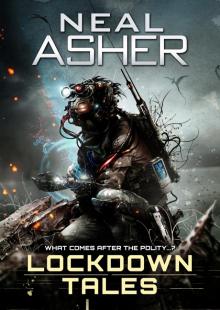 Lockdown Tales
Lockdown Tales The Warship
The Warship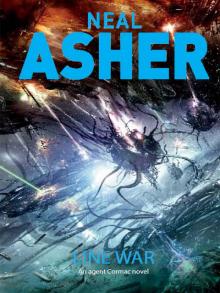 Line War
Line War Total Conflict
Total Conflict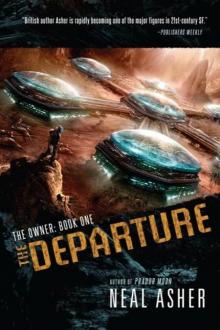 The Departure
The Departure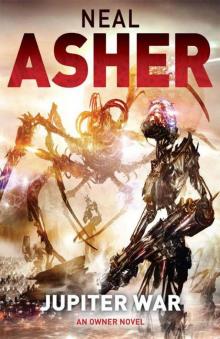 Owner 03 - Jupiter War
Owner 03 - Jupiter War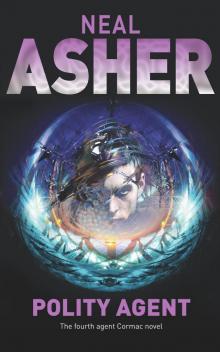 Polity Agent
Polity Agent Prador Moon
Prador Moon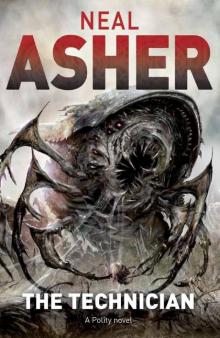 The Technician
The Technician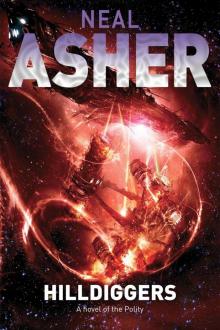 Hilldiggers
Hilldiggers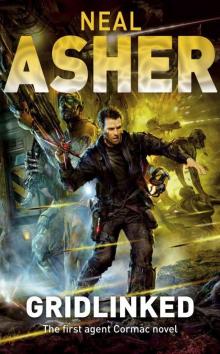 Gridlinked
Gridlinked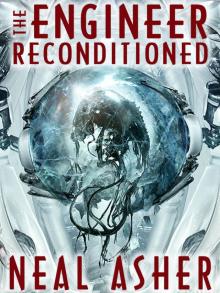 The Engineer ReConditioned
The Engineer ReConditioned Dark Intelligence
Dark Intelligence The Soldier: Rise of the Jain, Book One
The Soldier: Rise of the Jain, Book One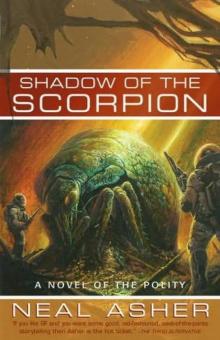 Shadow of the Scorpion p-2
Shadow of the Scorpion p-2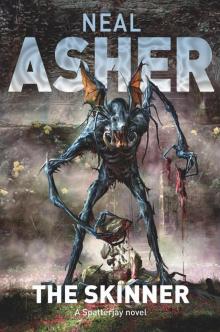 The Skinner
The Skinner The Soldier
The Soldier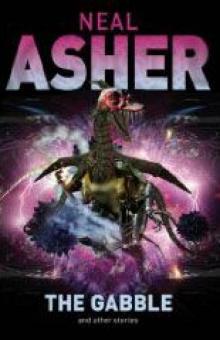 The Gabble p-13
The Gabble p-13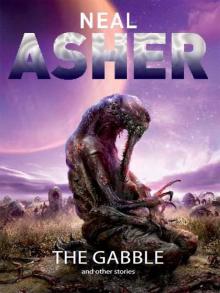 The Gabble and Other Stories
The Gabble and Other Stories The Parasite
The Parasite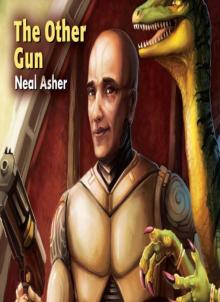 The Other Gun
The Other Gun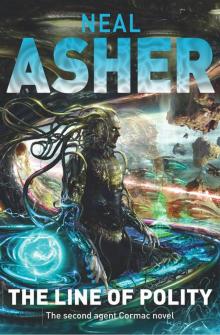 The Line of Polity
The Line of Polity Zero Point (Owner Trilogy 2)
Zero Point (Owner Trilogy 2)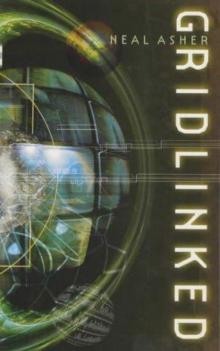 Gridlinked ac-1
Gridlinked ac-1 Prador Moon p-1
Prador Moon p-1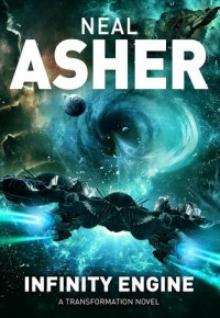 Infinity Engine
Infinity Engine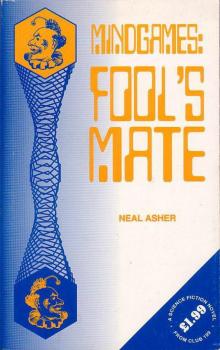 Mindgames: Fool's Mate
Mindgames: Fool's Mate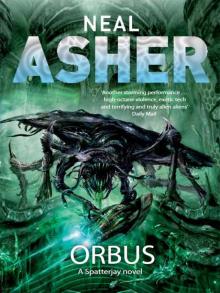 Orbus
Orbus Africa Zero
Africa Zero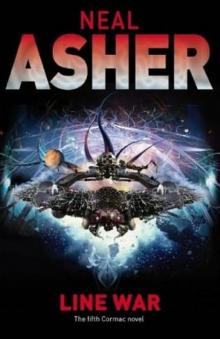 Line War ac-5
Line War ac-5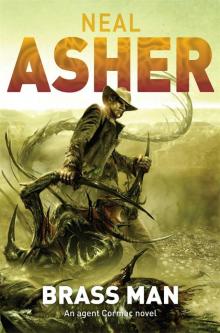 Brass Man
Brass Man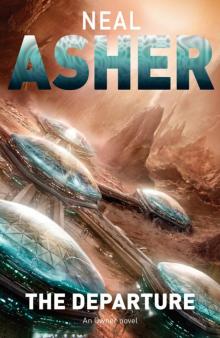 The Departure to-1
The Departure to-1 Cowl
Cowl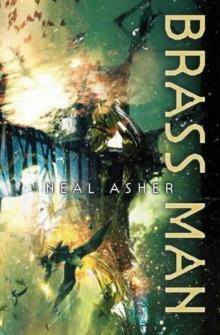 Brass Man ac-3
Brass Man ac-3 Hilldiggers (polity)
Hilldiggers (polity)![Greg Bear - [Eon Trilogy 1] - Eon (rescan) (v1.0) Read online](http://i1.bookreadfree.com/i2/04/08/greg_bear_-_eon_trilogy_1_-_eon_rescan_v1_0_preview.jpg) Greg Bear - [Eon Trilogy 1] - Eon (rescan) (v1.0)
Greg Bear - [Eon Trilogy 1] - Eon (rescan) (v1.0) The Skinner s-1
The Skinner s-1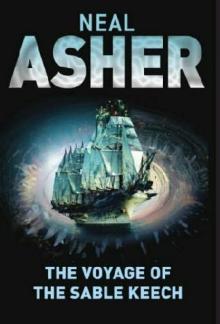 The Voyage of the Sable Keech s-2
The Voyage of the Sable Keech s-2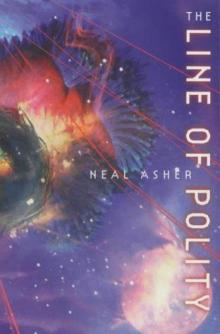 The Line of Polity ac-2
The Line of Polity ac-2 War Factory: Transformations Book Two
War Factory: Transformations Book Two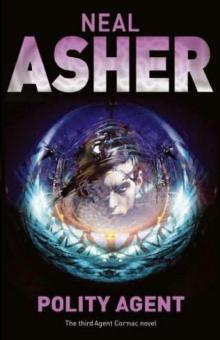 Polity Agent ac-4
Polity Agent ac-4